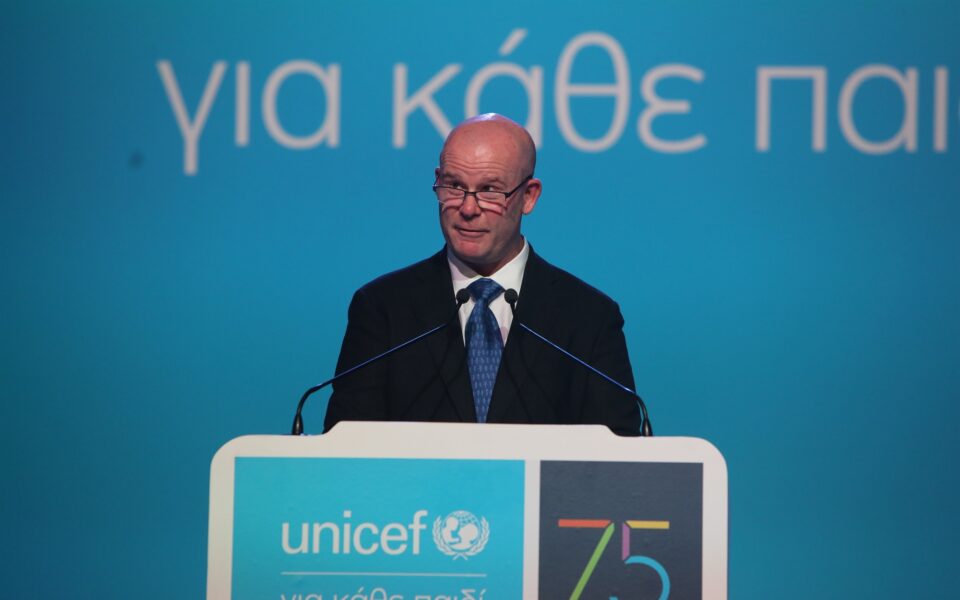Making children a top priority
UNICEF’s Greek Office chief tells Kathimerini he sees worrying trends as a result of chronic failures

Luciano Calestini loves Greece. “We,” he says when he talks about the Greeks, despite having lived in the country for a mere year and a half. “It’s my favorite country on Earth. If someone said to me, ‘You have to live here for the rest of your life,’ I would be very happy” he tells Kathimerini. Calestini, the first accredited representative of UNICEF in Greece, will stay in the country for a total of about four years before moving on to his next posting – until then though, there is a lot to be done.
In February, the executive board of UNICEF in New York approved Greece’s country program; by the end of next month, UNICEF will have signed all the relevant work plans with various Greek ministries, Calestini says. But how come UNICEF is in Greece, working – for the first time in such a coordinated manner – with a high income country and European Union member-state?
‘The average EU country spends 7,000 euros per child per year on education, we spend 2,688’
“Greece has a strong claim to being the worst country in the European Union to be a child,” Calestini explains. “This is what the data tell us,” he says. The data relate to obesity, child poverty and mental health, among other pointers. Greece, for example, ranks first in child obesity in the EU, and third in child poverty. “The situation for kids in Greece is not great,” he comments before going on to explain the reasons why. According to Calestini, these are four – “and they cannot be assigned to any particular government, any single institution. They are an accumulation of seven decades of policy action that has fallen short,” he claims. The first reason relates to the incomplete policy agenda for children in Greece. Ever since the country ratified the Convention on the Rights of the Child in 1993, it has promulgated over 80 laws or action plans relating to children, he says, but these action plans did not have set targets or budgets. “Despite what I would call genuinely valiant efforts by probably every government over the past half a century, we still do not have clarity on what is the national policy agenda for children and who is in charge,” he notes.
The second reason has to do with the quality and relevance of the services that the children are being provided. “The one that obviously gets the most airtime is the quality of the education system in Greece – what they are learning and how it is being taught to them – but there’s also the quality of the health system and the ability of the social protection system to include all vulnerable children within the safety net, which is not the case,” Calestini says.
The third reason is that we don’t spend enough on our children – “the average EU country spends 7,000 euros per child per year on education, we spend 2,688,” he adds. We should consider that Greece is still emerging from one of the most difficult economic periods in its history, he notes, underscoring that the fiscal choices we make today will have an impact on the future of the country. “We are risking an act of national self-harm by continuing to not prioritize our children,” he says. Today’s children will be called to deal with climate change, inequality, the refugee crisis – “a phenomenon that is not going away” – and, as the population shrinks, they will be required to economically sustain an aging population. “We need to rebalance our fiscal priorities to ensure that our children, who are the most left-behind children in Europe, are no longer the most left-behind children in Europe,” he argues.
Calestini notes that the data do not just refer to refugee or Roma children. About 600,000 children in Greece, for example, are obese – “There are fewer than 30,000 refugee children and if we assume that there are about 100,000 Roma children in Greece, we are still left with about 300,000-400,000,” he says. “It’s true that some issues disproportionately affect some communities, but we need to be very clear as a society that no city or town or village in Greece is immune from the challenge; we want to pretend that these issues are not truly on a national scale – they are on a national scale,” he notes.
Culture is the fourth reason behind the chronically dismal situation for children in Greece, and the most challenging one, according to Calestini, as it cannot be legislated but it is also what shapes our practices, attitudes and beliefs. He mentions an extremely common phenomenon in Greek society – children being looked after by their grandparents, noting that a child who is primarily cared for by a grandparent in Greece has a 58% higher chance of being obese.
But it is not all doom and gloom. During the course of Calestini’s nearly two-hour interview with Kathimerini – among other topics, child abuse (“my personal opinion is that it has always been there, but it might be getting worse because no one paid attention to why,” he says), extreme poverty, the pandemic, his positive back-and-forth with the Greek Orthodox Church (“arguably the most influential institution in the country”), and the damage done with in arbitrary actions of the national committee which was using the UNICEF logo and was active until 2018, were also discussed – Calestini frequently notes how hopeful and positive he is about the direction and course of action the country is taking. “The welcome from the various state institutions that we work with has been overwhelmingly positive, the very extroverted approach of this government has been really encouraging to me, I take it as really positive that Greece has been bold enough to say that progress hasn’t been as good as it needs to be, and so we are going to put ourselves out there and we are going to do something different and that different thing includes having UNICEF help us,” he says. “I just hope,” he adds, “that we can sustain what we have started, that it will be sustained across governments.”





